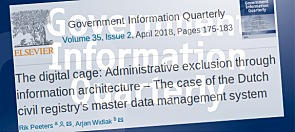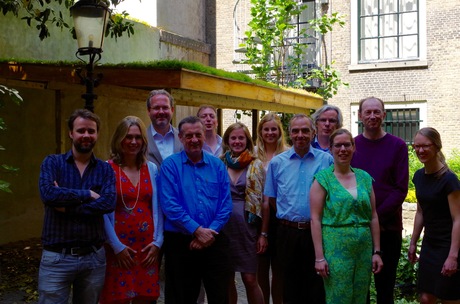Nieuws
Stay informed and read all about our publications, research and innovations.
A theory of the infrastructure-level bureaucracy: Understanding the consequences of data-exchange for procedural justice, organizational decision-making, and data itself
Widlak, A.C. & Peeters, R. (2025) Government Information Quarterly Vol 42, Issue 2, June 2025, 102021
Highlights
- Many problems in contemporary digital government can be traced back to organization of information flows.
- Data-exchange rather than the design of individual government applications can best explain the loss of procedural justice.
- Loss of capacity for democratic control of data-exchange is best observed on the level of the information infrastructure.
- We formulate hypotheses on affordances and limitations of information infrastructures for data, organizations and citizens.
Abstract
The interconnectedness of government organizations through data-exchange is proliferating. This is relevant for many debates in public administration today since all applications of data-driven government rest on a foundation of data. In this article, rather than focusing on specific applications, we analyze the way supra-organizational data-exchange shapes such applications and specifically automated administrative decision-making (AADM). We argue that the whole of bureaucracy that is connected through data-exchange implies the organizational separation of the collection or gathering of government data from the exchange, modification, combination and/or analysis and subsequently its (re)use in decision-making processes. To analyze the consequences of this new division of labor we further develop the concept of the infrastructure-level bureaucracy and formulate hypotheses on its consequences for data itself, organizations, and citizens. Ultimately, we argue infrastructural information flows pose challenges for democratic control and for procedural lawfulness in the constitutional state.
Award for best scientific publication by a non-academic
Louis Brownlow Award for "Administrative Exclusion in the Infrastructure-level Bureaucracy"

In 2023, Rik Peeters and Arjan Widlak published a scientific article in Public Administration Review. In it, they explore a broader understanding of how administrative exclusion and administrative burdens arise. They do this using (part of) the childcare benefit scandal as a case study and considering technology as an institutional factor, particularly data exchange. They introduce the concept of the "infrastructure-level bureaucracy", the entire network of organizations connected through data exchange. This information infrastructure has its own characteristics that make it susceptible to exclusion mechanisms. The separation between data collection and use leads to unpredictability and a lack of accountability. The article also aimed to challenge the dominant view that administrative burdens are always political, but politics by other means. However, the lack of insight and overview of the data infrastructure alone proved insufficient to explain the outcomes in the childcare benefit scandal. Although it can lead to governments no longer being able to follow the reasoning behind their own decisions. The established explanation of political intent was also necessary to explain the outcomes in this part of the childcare benefit scandal. The report by the parliamentary interrogation committee, more than a year after publication, has substantiated that point with much more source material.
The article won the Louis Brownlow Award last month for the best article in Public Administration Review written by a practitioner.
Burdens on the Gateway to the State: The Construction of Administrative Burdens in the Registration of People Experiencing Homelessness in Belgium and the Netherlands
Research article in Journal of Policy Analysis and Management
Abstract
Population registries are the gateway to public services, benefits, and rights. However, despite clear formal rules and procedures, people eligible for registration may still face administrative burdens in obtaining access. In this article, we study the case of the municipal registration of people who experience homelessness in Belgium and the Netherlands—a group that typically suffers from administrative vulnerability. Using data from 61 interviews with social workers and civil servants, we find that burdens are constructed at the municipal level to disincentivize homeless people's access to registration. However, using the Institutional Analysis and Development Framework, we also identify mechanisms in the governance of population registrations and the decentralization of social policies that create incentives for strategic behavior by municipal policy makers and street-level bureaucrats. By analyzing the interaction between multiple institutional levels, we contribute to understanding how structural mechanisms influence policymakers’ agency in the construction of administrative burdens.
Robben, L.-l., Peeters, R., & Widlak, A. (2024). Burdens on the gateway to the state: Administrative burdens in the registration of people experiencing homelessness in Belgium and the Netherlands. Journal of Policy Analysis and Management, 1–24. https://doi.org/10.1002/pam.22598
Webinar on the use of black lists in combination with ADM
Coming up: Marlies van Eck and Arjan Widlak are organizing a webinar on the use of black lists in combination with Automated Decision Making in the Dutch Tax Administration
You may have heard last years news that one branch of the Dutch Tax Administration used profiles to combat fraud. These profiles led to severe consequences for people with child care benefits. After this affair members of the Parliament asked for in dept independent research on the rest of the Tax Administration, leading to -again- disturbing findings. We learned about “FSV”.
Do you want to know more? And perhaps request a personal invitation for the webinar?
The Digital Cage in Government Information Quarterly
Publication based on the book The Digital Cage (in Dutch) was published.

The Digital Cage is a book currently only available in Dutch on maladministration in eGovernment caused by information architecture. This article is an extended version of chapters 6 and 7 of the book on the loss of legal protection and the mechanisms that cause these unintended consequences. A summary of the mechanisms, paragraph 6 of the article, can be found on the website accompanying the book (in Dutch).
Peeters, R., Widlak, A., 2018, The digital cage: Administrative exclusion through information architecture – The case of the Dutch civil registry's master data management system, Government Information Quarterly, 35, (2) (2018), pp 175-183
Highlights:
- • Master data management systems can produce unintended consequences for citizens in the form of administrative exclusion.
- • Administrative exclusion is often seen as a problem of street-level bureaucracy, but can also stem from system-level information architecture.
- • Digitalised civil registries can turn into a ‘digital cage’ if their design does not allow for street-level discretion and correction of errors.
Abstract
Digital India
Public Managers from India learn hands-on with Simulation Game on Cooperation with ICT about upsides and downsides of Dutch Generic Digital Infrastructure
 The Dutch Generic Digital Infrastructure has contributed enormously to the efficiency of Dutch public administration. As a contribution to a training program of PBLQ - one of the founding partners of the Kafkabrigade - around Citizen-centric online services through e-Governance, the Kafkabrigade used a simulation game to allow the participants to actually experience how the benefits cooperation with ICT can be created and how the transformation of government can take place. However cooperation with ICT can also be a lever for the dysfunctional side of bureaucracy, flooding citizens with registration demands or assume wrongly that data has the same meaning in different contexts. With a teaching case the other side of the Dutch Generic Digital Infrastructure is shown as well. The masterclass showing both outcomes of the Dutch system was highly appreciated and will have a follow-up.
The Dutch Generic Digital Infrastructure has contributed enormously to the efficiency of Dutch public administration. As a contribution to a training program of PBLQ - one of the founding partners of the Kafkabrigade - around Citizen-centric online services through e-Governance, the Kafkabrigade used a simulation game to allow the participants to actually experience how the benefits cooperation with ICT can be created and how the transformation of government can take place. However cooperation with ICT can also be a lever for the dysfunctional side of bureaucracy, flooding citizens with registration demands or assume wrongly that data has the same meaning in different contexts. With a teaching case the other side of the Dutch Generic Digital Infrastructure is shown as well. The masterclass showing both outcomes of the Dutch system was highly appreciated and will have a follow-up.
Kafkabrigade visits Serbia
Fighting bureaucracy and fostering innovation in the civil service
 The The Hague Academy for Local Governance allowed the Kafkabrigade to contribute to the Matra Coprol program “Leadership for security and rule of law” in Belgrade, that supports candidate members for the European Union. Using teaching cases that the Kafkabrigade developed based on research in the last decade, participants discussed how mechanisms in bureaucracy can both protect a system of values as well as become dysfunctional.
The The Hague Academy for Local Governance allowed the Kafkabrigade to contribute to the Matra Coprol program “Leadership for security and rule of law” in Belgrade, that supports candidate members for the European Union. Using teaching cases that the Kafkabrigade developed based on research in the last decade, participants discussed how mechanisms in bureaucracy can both protect a system of values as well as become dysfunctional.
Rethinking Regulation for the Sharing Economy
Using the principles of the Kafkabrigade to move beyond opinion to understanding the problem and engage stakeholders
these individuals helped to develop ideas for effective regulation, which can be defined as regulation that creates public value, supports innovation and reduces administrative burdensThe rising popularity of the sharing economy is not only disruptive for existing markets like transportation (Uber) and accomodation (AirBnB). It also forces governements to rethink regulation for these and other markets. There's no lack of opinions and debate about how to regulate the sharing economy. Marsdd is a Canada based innovation hub led by Kafkabrigadeer Joeri van der Steenhoven that uses the principles from the Kafka Method to move beyond opinions to actually understand what the problem really is and to move beyond debate to engaging relevant stakeholders in a constructive conversation. Because the sharing economy is more than Uber and AirBnB. It's a broader phenomenon with both great opportunities and challenges. When it comes to regulating the sharing economy, government should not only look to regulate new entrants, but also to revisit current regulations to reduce the administrative burden for existing operators. For this they interviewed 136 individuals, convened 100 relevant stakeholders and brought together regulators from all three levels of governement - municipal, provincial and federal -, industry representatives and experts. In three different workshops these individuals helped to develop ideas for effective regulation, which can be defined as regulation that creates public value, supports innovation and reduces administrative burdens.
New Kafkabrigade in Mexico
The network is growing
 In the spring of 2016, the Kafkabrigade Mexico will be opening its doors in Mexico City. Rik Peeters joined the Kafkabrigade shortly after his promotion on prevention policy. Just a year ago he moved to Mexico, where he now starts a Kafkabrigade as part of the Kafkabrigade Network. Together with a Mexican partner tried and tested in the Mexican public administration he's about to broaden the fight against red tape and bureaucratic dysfunction.
In the spring of 2016, the Kafkabrigade Mexico will be opening its doors in Mexico City. Rik Peeters joined the Kafkabrigade shortly after his promotion on prevention policy. Just a year ago he moved to Mexico, where he now starts a Kafkabrigade as part of the Kafkabrigade Network. Together with a Mexican partner tried and tested in the Mexican public administration he's about to broaden the fight against red tape and bureaucratic dysfunction.
Coming soon: Retraite 2016
The new yearly meeting of Kafkabrigades
 On June 12th and 13th 2015 Kafkabrigadeers from the United States, South Afrika, the United Kingdom and the Netherlands gathered to discuss findings and reflect on mission and methods. Scaling and sustainability were the two central themes. Making a successful innovation sustainable for the larger category is not self-evident, nor is the enhancement of the capacity for change. The same goes for the sustainability of innovations. Each of the themes was introduced with both a poster case and a failed case. With the central question: how can we adapt to do better? From the discussion a large list of ways to measure and monitor the effects of the collective performance review and to organize the pressure needed to make change successful was created.
On June 12th and 13th 2015 Kafkabrigadeers from the United States, South Afrika, the United Kingdom and the Netherlands gathered to discuss findings and reflect on mission and methods. Scaling and sustainability were the two central themes. Making a successful innovation sustainable for the larger category is not self-evident, nor is the enhancement of the capacity for change. The same goes for the sustainability of innovations. Each of the themes was introduced with both a poster case and a failed case. With the central question: how can we adapt to do better? From the discussion a large list of ways to measure and monitor the effects of the collective performance review and to organize the pressure needed to make change successful was created.
- Previous Page
- 1
- 2
- Next Page»
